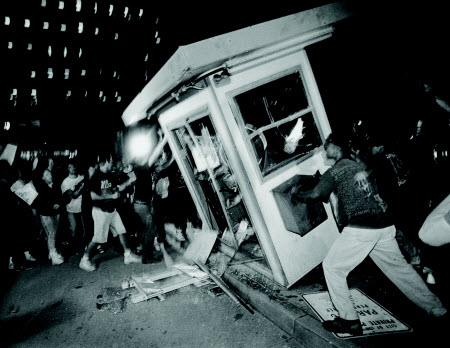What to Know About ‘The Lost Tapes: L.A. Riots’
The smarter way to stay on top of the multichannel video marketplace. Sign up below.
You are now subscribed
Your newsletter sign-up was successful

Smithsonian Channel on April 23 will air the documentary special The Lost Tapes: L.A. Riots, which features video footage, police recordings, local media accounts and interviews that capture a six-day period during the summer of 1992 in which the city of Los Angeles experienced an explosion of protests and riots over the acquittal of four LAPD cops in the beating of black taxi driver Rodney King.
The Smithsonian special, the third in a series of “Lost Tapes” specials focused on historical events, is one of several documentaries airing in April — including Showtime’s Burn Motherf*cker Burn! (April 21) and National Geographic Channel’s LA 92 (April 30) — marking the 25th anniversary of the deadly uprising.
David Royle, executive vice president of programming and production for Smithsonian Channel, spoke with Multichannel News about the network’s unique take on the riots, as well as the recent appeal of historically-themed documentary features. Here’s what he’d like viewers to know.
Viewers will see content never seen before: “The whole basis of the series is to really allow people to experience events for themselves and draw their own conclusions. The show is made simply with film footage, radio reports, photographs, and newsreels — everything that happened and was reported at the time. It makes you feel like you were there in the midst of often turbulent and searing events. With the L.A. Riots, what we’ve been able to do is access hours of footage shot by police officers in the LAPD during the riots, much of which has never been broadcast before. That speaks for itself. We also have footage from a small radio station — KJLH in Compton — which was actually a music station, but during the riots went from being an all-music station to reporting all of the events that went on, and allowing people to call in and vent their frustrations and their fears. So on the one hand, you have the LAPD recording what’s going on, and on the other hand you have a small radio station recording what’s going on. So there are multiple perspectives being put into this program, and the viewer is being left to decide which one have the best credibility — maybe they all do — but the audience gets to discern from all these perspectives what is the reality of what was happening.”
This is history for the Internet age: “In some ways [The Lost Tapes] is going back to a traditional form of storytelling — after all, it’s relying on primary sources — but in other ways, it’s very modern and contemporary. We have a generation today who is used to learning about the world from searching the Internet. They look for raw, unedited clips, such as recent footage of people getting shot, and play it endlessly trying to interpret for themselves what it means. That’s what we do in The Lost Tapes — we put all the footage out there of events as they happen. We’re plunging the viewer back into time into the midst of that dramatic period and we’re allowing them to make up their own minds.”
It’s real life drama that’s engaging: “We’re seeing some really interesting movements with nonfiction channels going on right now. A lot of them seem to be running away from reality programming and going into big dramas. We believe there’s as gap in the marketplace and a public hunger for programming that is real dramatic, enticing but grounded in a true world of history. We want to showcase great drama that doesn’t need reinventing — we think there’s enough drama in history without a need to reinvent it. We want viewers to experience real life told in a dramatic fashion, but television they can trust, absorb and that enriches their understanding of the world.”
The smarter way to stay on top of the multichannel video marketplace. Sign up below.
R. Thomas Umstead serves as senior content producer, programming for Multichannel News, Broadcasting + Cable and Next TV. During his more than 30-year career as a print and online journalist, Umstead has written articles on a variety of subjects ranging from TV technology, marketing and sports production to content distribution and development. He has provided expert commentary on television issues and trends for such TV, print, radio and streaming outlets as Fox News, CNBC, the Today show, USA Today, The New York Times and National Public Radio. Umstead has also filmed, produced and edited more than 100 original video interviews, profiles and news reports featuring key cable television executives as well as entertainers and celebrity personalities.

